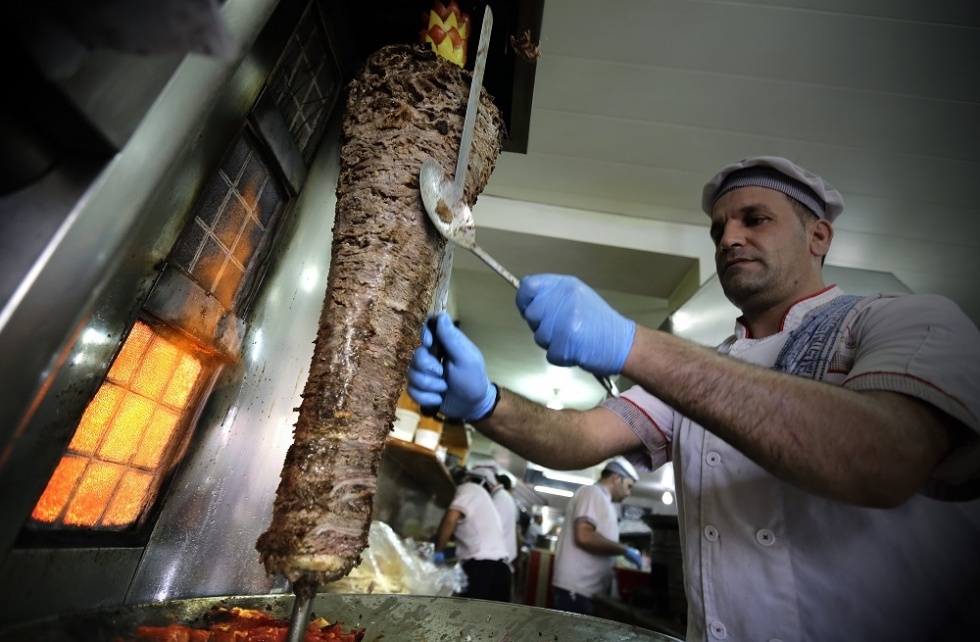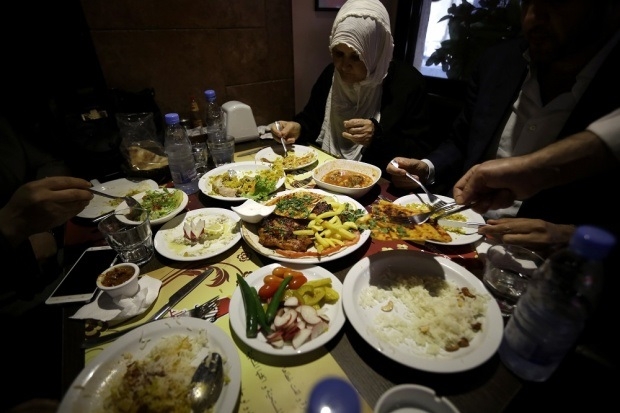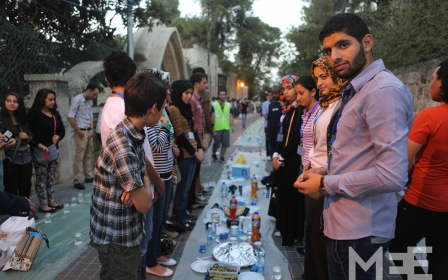Lebanon’s food safety scandal refuses to go away

BEIRUT - The queue outside the seventh floor office of Dr. George Saad - the man in charge of “food safety” at Lebanon’s Ministry of Health - has been growing for months.
Mahmud, a restaurant owner, is one of the many who has come here to wait and to get inspection results from his family’s eatery signed off. The process has become a difficult one of late, with the country struggling to cope with the ramifications of a debilitating food scandal that first emerged last year and snowballed as restaurants and retailers were revealed to be selling contaminated food that sometimes even had traces of feces.
Mahmud, a third generation restaurateur in his thirties, would not give his real name out of fear that it would damage his business’ reputation, but was keen to recall his tale.
The government inspectors first came to his premises at the start of December 2014 to take samples of food and water. Thanks to the Ministry’s crackdown, the inspectors were particularly meticulous, something that the normal inspectors from the Beirut Municipality had not been until then.
The inspectors found nothing wrong with his food, but they did find the potentially deadly E. coli bacteria in the water supply.
“We had no idea that was even a possibility,” he told Middle East Eye. “It’s a government source, it’s supposed to be drinkable.”
While inspectors were very diligent and helped Mahmud to install the necessary equipment such as UV filters, sterilisers and chlorine pumps, Mahmud is not off the hook yet. Like scores of other restaurant owners and food vendors, he is now living in uncertainty – unsure of what the new food safety rules mean, unsure about who will be enforcing them, and most of all unsure about what all of this will mean for his business.
“It took one day; now we just need it to be tested again,” he said.
Crisis conference
The crackdown hit the headlines in November last year when Minister of Health Wael Abou Faour decided to hold a press conference to name and shame some of the worst offenders.
The list Faour read was long, too long for most to stomach. On it were some of the biggest and best-trusted names in Lebanon, among them the luxury supermarket chain, Spinneys, as well as upmarket brand, TSC Mega. There were also a host of fast food chains including MacDonald’s, Kababji, not to mention a host of ‘mom-and-pop’ style eateries that are popular throughout Lebanon.
In this first press conference, the first of many, Faour stressed that he wasn’t hoping to undermine violators or to damage their revenues, but said that he had to take drastic measures to protect consumer health – something he had pledged to do upon taking office in April 2014.
“From September until the end of November he [Faour] was collecting the results,” the Ministry’s head of nutrition, Wafaa Houmani told MEE. He was pushed into action by a “growing number of complaints about cases of food poisoning” that began arriving directly at the ministry or through its hotline, Houmani explained.
The list of violations was equally as long and shocking, with food samples testing positive for everything from Salmonella and E. coli to raw sewage and human excrement.
Some of the retailers hit back, saying that the ministry was scaremongering and using unnecessarily harsh tactics, but the damage was done and the issue of food safety catapulted to centre stage.
“It’s bullshit,” said Ali, a self-confessed Roadster fast food chain fanatic.
“I go there [Roadster] about three times a week, to different branches, and I’ve never had a problem. Maybe it was political, I don’t know.”
Whether or not politics has something to do with the public shaming, Ali wasn’t surprised to learn that there were health and safety issues with food.
Scandal ramifications
While some violators have been shamed, and others have worked hard to rectify inconsistencies, the road ahead is daunting and the checks in place to make sure this never happens again few and far between.
As it stands, there is no one defining food safety law in Lebanon, and when it comes to what is required, legally, of restaurants and supermarkets, it all gets a bit foggy.
Until the Ministry of Health’s naming and shaming conference, there appears to have been a lax attitude to the state of food safety - there were no government-approved guidelines and there didn’t seem to be any penalties for violating what should be the most basic of hygiene rules. There was also a lot of ambiguity about who exactly was in charge. While one restaurant would say it answered to the Beirut Municipality, another neighbouring one quite easily could say that it did not.
“Why have there been no laws or guidelines from the government? Well, welcome to Lebanon,” said Mahmud. Instead, his family’s restaurant - which has been going for 37 years - has regulated itself. It has not followed any particular set of health and safety guidelines but, like so many others, have just operated according to their own rules.
According to Walid Hayek, the head of the Syndicate of Owners of Restaurants, Cafés, Night-Clubs and Pastries in Lebanon, self-regulation is very common.
“There are three kinds of restaurants in this sector: those who internally adopted food safety standards a long time ago, those with good intentions but that don’t have the know-how, then those who are just bad.” It is the latter that Hayek says the Ministry decided to crack down on.
“I don’t think there was a need to mention names on the TV though, and why only this sector? Food poisoning levels are about the same as the UK and the US,” he said.
Food poisoning records are difficult to estimate, with few sufferers seeking professional treatment, but irrespective of the consequences, Hayek insists it is hypocritical of the ministry to push these tests on food purveyors when the government has few official guidelines in place.
“Why would you do an inspection on something you don’t even have standards for?” Hayek said.
The lack of a discernible and steadfast implementation of any health and safety laws means that back in 2012 there was a similar incident. A TV station publicly listed a number of restaurants that were fined for selling rotten meat. The same year, Saudi Arabia also sent back a shipment of the famous herb za’atar (a traditional thyme and sesame seed blend) when lab tests found it didn’t contain even 50 percent actual za’atar.
Back then the scandal came and went, but this time the health ministry campaign appears to be staying the course.
The minister has come down hard. Practically every week has seen a press conferences citing new closures, such as slaughterhouses, as well as new means with which to threaten establishments for non-compliance such as police raids.
The reports about the discovery of “tons” of spoiled beans, or wheat supplies being infested by rats, or entire spoilt sugar mountains threatening to make it to the market have all been making it to the headlines.
One noticeable flaw in the Ministry of Health’s crackdown, though, according to critics, has been a case of too many cooks.
According to Mahmud, the Health Ministry’s collaboration with the Ministries of Economy and Agriculture has created problems, and caused a lot of inconsistencies about what owners should actually be doing.
“One group came from the economy ministry to take samples … They didn’t even bring sterilised bags,” he said, while complaining that the standards set by one ministry often didn’t match those set by another.
Legal uncertainty
The introduction of a strong and defining law to monitor the situation is one of the main ways being touted as way out of the predicament. After an initial delay, a draft law was finally introduced at the end of January and accepted by Lebanon’s often bitterly divided parliament.
The Ministry of Health also announced that it would be introducing a new checklist for inspectors of restaurants. “We did have a checklist before, but this is a more unified one,” said a ministry spokesperson.
But as is all too often the case in Lebanon, even this quite basic progress has been staggered.
“We are still waiting on the draft law to be approved before finalising the checklist,” the spokesperson said.
When the draft law becomes permanent, however, seems to be anyone’s guess.
The ministry spokesperson couldn’t tell MEE much more about the next step, just that his office was waiting for the law to be passed. This, however, could take 15 days, 15 months, or maybe another 15 years.
Another draft law similar to this was actually presented back in 2000 by the late economy minister, Bassel Fleihan. It soon ended up taking a back seat as it was deemed to be not be a “priority”, according to a ministry spokesperson.
If this draft is eventually approved, it offers to overhaul the system through the creation of a Lebanese Food Safety Commission, the establishment of penalties for violators, as well as harsher rules for the agricultural sector, water suppliers, slaughterhouses, the conditions of animals, and packaging firms. One punishment, cited in news reports, for non-compliance will be “notifying the media about the contaminated products”.
“I think the campaign was needed,” said the Syndicate’s Hayek. “In my opinion at least 50 percent of people are now automatically starting to pay more attention to this, so definitely it was needed.”
Others, however, continue to insist that the changes may prove difficult to enforce and even more difficult to understand.
“It’s good what they’re doing but it would have been logical to have one part of the government dealing with us, not three or four agencies,” Mahmud said.
Middle East Eye propose une couverture et une analyse indépendantes et incomparables du Moyen-Orient, de l’Afrique du Nord et d’autres régions du monde. Pour en savoir plus sur la reprise de ce contenu et les frais qui s’appliquent, veuillez remplir ce formulaire [en anglais]. Pour en savoir plus sur MEE, cliquez ici [en anglais].





